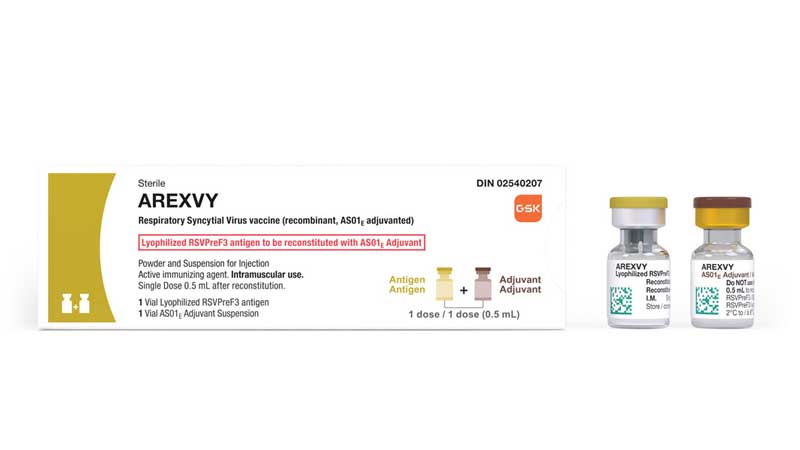⚕️ Gsk's Arexvy, the First Respiratory Syncytial Virus (Rsv) Vaccine Approved in Canada for Adults Aged 50-59 at Increased Risk
Thursday, 07 November 2024 08:00.AM
- Ahead of peak RSV season, Canadians aged 50-59 years at increased risk for RSV disease can now better protect themselves against this vaccine-preventable disease.
- Adults aged 50 and older with a history of chronic conditions, including diabetes, asthma, chronic obstructive lung disease and heart failure are up to 3-13 times more likely to be hospitalized with RSV than adults without these conditions1.
-Clinical development program continues to evaluate safety and immunogenicity in adults aged 18-49 at increased risk of RSV disease and immunocompromised adults aged 18 and over (authorization in these populations has not yet been granted). -
GSK's AREXVY (respiratory syncytial virus vaccine - recombinant, AS01E adjuvanted) has been approved in Canada for the prevention of lower respiratory tract disease (LRTD) caused by respiratory syncytial virus (RSV) in adults 50-59 years of age who are at increased risk for RSV disease.2 In Canada, the vaccine was previously approved for use in adults aged 60 and older and is strongly recommended by the National Advisory Committee on Immunization (NACI) for all adults 75 years and older and those aged 60 and above in nursing homes and other chronic care facilities. NACI also recommends that adults aged 60-74 years may consider RSV vaccination in consultation with a health care provider.3
A systematic review of studies in the US showed that RSV is estimated to cause 42,000 hospitalizations* each year in adults aged 50-64 years old.4 Further, among Canadian adults aged 50 and older hospitalized with RSV, about 98 per cent have at least one chronic condition.5 Adults with chronic medical conditions, such as chronic obstructive pulmonary disease (COPD), asthma, heart failure and diabetes, are at increased risk for severe consequences from an RSV infection compared to those without these conditions.6,7 RSV can exacerbate these conditions and lead to pneumonia, hospitalization, or death.8
Michelle Horn, Interim Country Medical Director, GSK said: "The natural age-related decline in immune function we all experience, which can increase our vulnerability to viruses like RSV, becomes more evident the older we get. Not surprisingly, incidence of RSV-associated hospitalizations in adults starts to increase at the age of 50. For adults with underlying medical conditions, RSV can worsen these conditions and lead to serious consequences. We are proud to be the first to provide a vaccine to help protect Canadians aged 50-59 at increased risk of lower respiratory tract disease caused by RSV."
The expanded age indication is based on the positive results from a phase III trial [NCT05590403] evaluating the immune response and safety of GSK's RSV vaccine in adults aged 50-59, including those at increased risk for RSV-LRTD due to underlying medical conditions.
Approval of an expanded age indication for AREXVY in Canada follows similar approvals in the US and the EU. GSK has also filed regulatory submissions to extend the use of its RSV vaccine to adults aged 50-59 at increased risk in Japan and other geographies with regulatory decisions undergoing review. Trials evaluating the immunogenicity and safety of the vaccine in adults aged 18-49 at increased risk and immunocompromised adults aged 18 and over are expected to read out later in 2024. The safety and effectiveness of Arexvy in adults aged 18-49 at increased risk for RSV disease and immunocompromised adults aged 18 and over are still under investigation and authorization has not yet been granted in any country.
About RSV in adults
RSV is a common contagious virus affecting the lungs and breathing passages. Adults can be at increased risk for RSV disease due to comorbidities, immune compromised status, or advanced age.8 RSV can exacerbate conditions, including COPD, asthma, and chronic heart failure and can lead to severe outcomes, such as pneumonia, hospitalization, and death. According to studies conducted in the US, RSV is estimated to cause approximately 177,000 hospitalizations in adults 65 years and older and 42,000 in adults aged 50-64 years old.
SOURCE: GlaxoSmithKline Inc.
